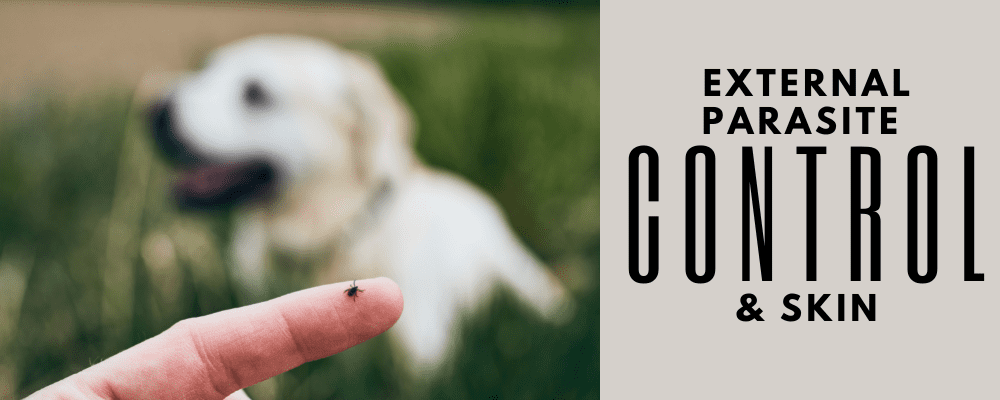At some point in their lives, many pets experience discomfort caused by external parasites such as fleas, ticks, or mites on their skin or in their ears.
These parasites can be extremely irritating to pets and can cause serious skin problems or even carry disease. Modern medicines make treatment, control, and prevention of many external parasites much easier than in the past. Good external parasite control is essential for healthy skin.
It is important to have a basic understanding of some of the most common parasites so you know how to identify which ones can really affect your pet’s health.
Fleas
You may not see the flea, but you will see what the flea leaves behind. Flea dirt (excrement) is black in color and small, like bits of dirt. You will likely see redness on the skin from flea bites, and your dog will scratch from the irritation. Excessive scratching can lead to skin infections.
Ticks
They are somewhat round and range in size from nearly microscopic to as large as a ¼-inch after a meal. Ticks carry diseases that are spread through the tick’s mouth when it is attached to your pet. Ask your veterinarian about the best method to remove ticks from your pet.
Ear Mites
Found in and around your pet’s ears, these mites are tiny and white in color and are too small for you to see. Ear wax is their meal. Your pet will scratch its ears or shake its head to soothe the mite-bite irritation. Not only can this lead to secondary bacterial and yeast infections, but it can also cause blood pockets from broken blood vessels that may need surgery to clear.
Mange Mites
Depending on the variety of mite, symptoms can range from skin irritation, scratching, hair loss, and mange. Yes, some mange mites can transfer to humans.
Lice
Cats and dogs and humans attract their own, distinct types of lice. Scratching and hair loss are symptoms of a lice infestation on your pet.
Some points to keep in mind:
- Look for fleas, ticks, and coat abnormalities any time you groom your dog or cat or when you return home from areas that are likely to have higher numbers of these parasites.
- Consult your veterinarian if your pet excessively scratches, chews, or licks his/her coat, or persistently shakes his/her head or scratches his/her ears.
- Prompt treatment of parasites lessens your pet’s discomfort, decreases the chances of disease transmission, and may reduce the degree of home infestation.
- Discuss the health of all family pets with your veterinarian when one pet becomes infested. Some parasites cycle among pets, making control of infestations difficult unless all household pets are considered. Consult your veterinarian before beginning treatment.
- Tell your veterinarian if you have attempted any parasite remedies, as this may impact your veterinarian’s recommendation.
- Always follow label directions carefully when using flea and tick preventives.
- Be especially careful when applying insecticides to cats, as cats are particularly sensitive to these products. Never use a product that is not approved for cats because the results could be lethal.
- Consult the experts. Your veterinarian offers technical expertise and can assist you in identifying products that are most likely to effectively and safely control your pet’s parasite problem
If you suspect these pests are alive and well on your fur babies, call us to make an appointment.
